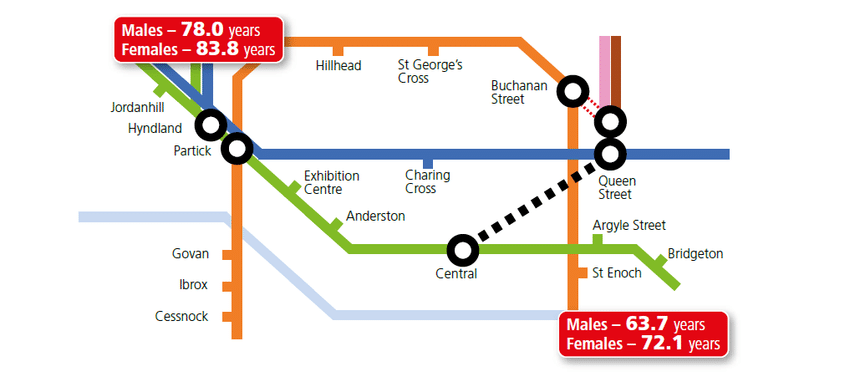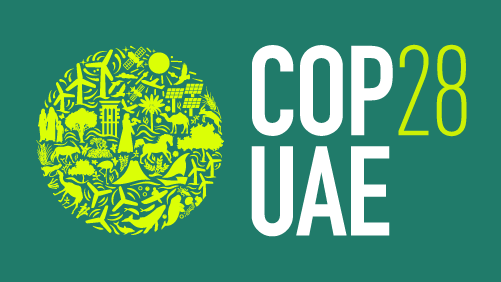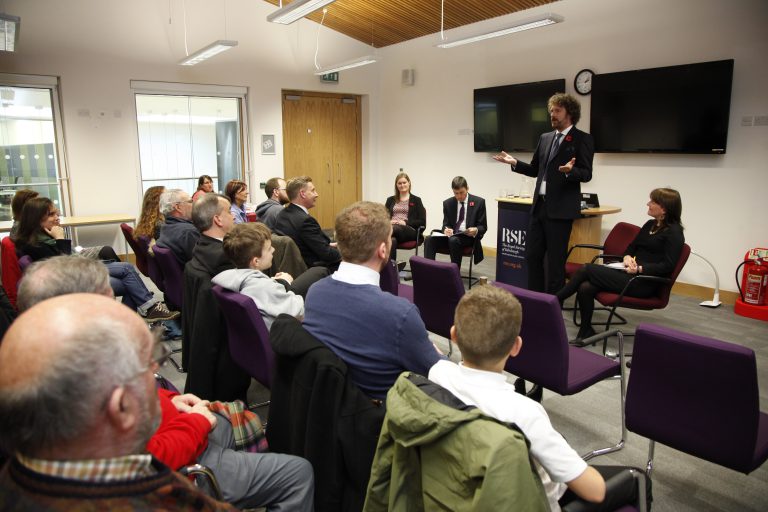A Fair and Sustainable Scotland: How fair is fair?
Tuesday 3 October 2023, at the Scottish Parliament
Scotland has clear ambitions: eradicating child poverty, becoming a net zero country, and developing an entrepreneurial and inclusive economy. But our problems remain entrenched. We have deep and increasing inequalities, worsening life expectancy, and public services struggling to meet demand in the aftermath of the Covid-19 pandemic.
In this context, how do we want Scotland to change over the next 20 years? Complete equality of outcome is impossible, so what does success look like? How will we tell when we have a fair country? And what should we be doing now to build it?
Our expert panel considered different futures for Scotland:
- Professor Graeme Roy, from the University of Glasgow and Scottish Fiscal Commission
- Satwat Rehman, chief executive of One Parent Families Scotland
- Graeme Armstrong, award-winning author
Chaired by Esther Roberton, a Futures Forum director, this event contributed to a project on tackling structural inequalities in Scotland.
Initial reflections from the Panel
To kick off the event, the three panellists offered their reflections on the question of fairness, highlighting themes such as the causes of poverty and inequality, the metrics used to measure success and the cultural as well as material factors at play.
“Poverty is not inevitable”
A question was posed: do we think of Scotland as a fair country? The panellists addressed the need to be specific about definitions, and how we decide what is fair.
As Graeme Roy noted, economists tend to focus on income inequality and key issues around access to economic opportunities.
Satwat argued that, rather than using the word “fair”, we should be talking about “just” and “justice” if we are striving for greater equality, because something can be unfair and nevertheless still just. Nonetheless, leaving aside the nuances of definitions, she summed up her response to the question as: “In a word, no”.
She highlighted her work with communities of people such as single parents, who were more likely to be in deep and persistent poverty and pointed out that there was currently no safety net in place for them.
As Graeme Armstrong argued, the present situation was in some ways worse than it was 20 years ago, with violence and poverty increasing.
Graeme Roy noted that, while Scotland was a fair country for most people who lived there, the challenge was that for a significant number of people, it was unfair. As he pointed out, the most recent statistics showed that a quarter of all children in Scotland lived in relative poverty.
He emphasised that the UK was one of the most unequal countries in the world in terms of income, although he noted that Scotland did slightly better through initiatives such as the Scottish child payment, which he suggested would have a significant impact on tackling inequality in the coming years.
Satwat agreed that Scotland was trying to address inequality using the social security powers that it had, but she commented that, in and of itself, that was not going to be enough. She emphasised the need to look at the root causes of poverty and the way in which it was embedded as a deliberate by-product of our economic system.
Satwat stressed that poverty was not inevitable and pointed out that the UK had managed to take steps to reduce poverty through various mechanisms in the past. She identified as a major issue the overriding focus in the UK on work as the route out of poverty, noting that the Joseph Rowntree Foundation’s report on “Poverty in Scotland” showed rising levels of in-work poverty here.
“There is an ambition deficit”
Turning to the interaction between social issues and inequality, Graeme Armstrong pointed out that just because someone was not experiencing poverty, did not make them immune to gang culture.
As he identified, there were powerful cultural forces at work, and to ascribe the persistence of Scotland’s gang problems to poverty was too simplistic an explanation. He suggested that what was striking about Scotland was that there was an ambition deficit. As he put it, young people were surrounded by global crises not of their making that they did not fully understand, and which they experienced almost second-hand through stressed-out parents and the media.
He explained that that created a pervasive sense of doom and hopelessness, which bred a reckless, devil-may-care attitude that fuelled risk-taking behaviour and acted as a recruitment tool for gangs.
“What we’re doing isn’t working”
As Satwat argued, seeking to identify and address the causes of poverty meant taking an intersectional approach that encompassed gender and race equality, sustainability, and poverty. She stated that we needed to point everything in the same direction if we wanted to address all those things, rather than seeing them as competing issues or believing that dealing with one would address all the others.
Satwat highlighted the need to think about Scotland’s just transition in an international context, asserting that we could not make a just transition to net zero without looking at how that affected racial minorities in this country and those in the global south.
Regarding the causes of poverty, she noted that a lot of our current inequality was based on extractive and exploitative economic systems in the West. She pointed out that structural racism played a part in poverty, for example by affecting people’s interactions with the labour market, as figures showed that certain minority groups had higher qualifications but much lower levels of earnings. She argued that for those communities, what we were doing to tackle poverty and inequality simply wasn’t working.
Linking in with the need for an intersectional approach, Satwat identified the importance of the metrics we used, as what we measured was what we would see as important. She argued that the metrics on which we currently focussed were exacerbating inequality, and that we needed to measure success more in terms of positive environmental outcomes and gender equality.
“What is the nature of wealth?”
Reflecting, in the year of Adam Smith’s tercentenary, on his statement that “No society can surely be flourishing and happy, of which the far greater part of the members are poor and miserable”, the panellists discussed what he might have made of inequality now.
Graeme Roy argued that Adam Smith’s terms still defined the debate around inequality today. Graeme pointed out that back then, when wealth was measured in gold and silver, Smith argued that what mattered were people’s living standards. Graeme pointed out that while Adam Smith defined wealth in terms of material consumption, there are debates around how we define wealth in 2023, taking into consideration things like sustainability, climate change and natural wealth.
However, Graeme argued that we could take a lot from the fundamental question that Adam Smith posed—what is the nature of wealth, and how do we become a wealthier nation? —and relate it to the issues around inequality and sustainability that we must discuss today.
Q&A session
“Equity is a political choice”
If Scotland is currently an unequal country, how equal could our society become, and were there any good models we could look to elsewhere? As Satwat stated, we all had different ideas of what equity should and could be, but a truly equal society could be hard to visualise in detail, because we had never seen it anywhere.
She noted that while Scandinavian countries were often seen as models of equality, this might come at a high price of conformity for minority communities in particular. She asserted that we needed to have a conversation about what we meant by “equal”.
Graeme Armstrong contended that equity should be not just about employment or mere survival, but how good life was for people in working-class communities.
Graeme Roy argued that “There will always be a level of inequality and different outcomes”, reflecting people’s preferences and their freedom to choose how much or little they worked and therefore earned. The key aim, in his view, was justice and access to economic opportunity, so that people were in a position to take those decisions.
On the question of which models we might look to, Graeme Roy noted that Scotland could be prone to looking at other countries and saying that a particular policy would work here, when the world was more complex than that. He stressed that, overall, how equal we became would come down to the choices that we collectively took. As he emphasised, we had chosen the level of inequality in this country: “Equity, ultimately, is a political choice”.
“How do we value what isn’t paid?”
It was questioned whether, in trying to address unfairness, we were looking in the right places in thinking about how we shifted the dial. Did we need to be more creative in a fast-moving world? Some things may be fair, but were they just? For example, participants argued that in a world of “techno-feudalism”, our unpaid labour was making big tech companies rich.
Satwat responded that the workforce had always been reliant on millions of people’s unpaid labour, noting that it was unpaid carers who helped to keep things going. She raised a crucial question: how do we value the work that is unpaid but essential? As she argued, our society promoted work as the route out of poverty, but that meant that unpaid work went unrecognised.
Graeme Armstrong agreed that big companies still had a great deal of power, and at an individual level, he raised the question of what counted as “employability”. He stressed that while ambition was important, there could be an anti-intellectualism in working-class communities, although practical efforts in retraining and digital literacy could help.
Graeme Roy stressed that our economy was changing radically, and that the nature of where wealth and power existed in our economy would shift as well. He highlighted the issue of how we tackled the causes of inequality in the first place, noting that the power of companies to influence policy making got into big questions about the future of taxation. For example, how should we tax wealth as well as labour in a multilateral way that crosses borders? He struck an optimistic note, flagging up the big changes that were made in the past, and stressing that “we need to keep reminding ourselves that for all the challenges that we face, there is a choice”.
“Let’s be practical and pragmatic”
The possibility of implementing a universal basic income in Scotland, and the concept of universalism more broadly, were raised by participants. Graeme Roy identified the key benefits of a basic income: it provided certainty and improved wellbeing and could potentially improve productivity. However, all the panellists stressed the importance of considering the practicalities.
Graeme Roy highlighted the immense scale of the challenge, noting that it was difficult to look at the concept of basic income without looking at changing the entire fiscal system. He posited that as part of planning and implementing UBI, we would need to change the conversation about how people viewed taxation and incentives to work, and how they valued not just their own income and wealth but that of society, noting that “all the evidence says we’re not there yet.”
Both Graeme Roy and Satwat noted the issues with how far the principle of universalism could be applied in practice. Satwat raised crucial questions about people’s expectations and emphasised the need to think about what we in Scotland could do with the powers we had: “Let’s be practical and pragmatic about how we address it and how we can pay for it.”
Graeme Armstrong made the point that, while introducing UBI might address the practical issues, “working class was a state of mind”. He stressed that, as such, bringing about a dramatic lift in people’s standard of living would also require a shift in value systems and mindset.
“What does it take to raise a village?”
Participants discussed issues of fairness more broadly, looking at taxation and pensions, and what the Government could do. Graeme Roy contended that institutions and services should be driven not purely by cost or efficiency, but by broader outcomes, which could have a positive impact.
He emphasised the need to think seriously about the type of economy that we wanted to create, highlighting that the big challenges that we faced, such as an ageing population, required difficult conversations about what we taxed and how we prioritised services. He agreed with Satwat that we needed to shift spend to prevention and away from failure demand, as a wellbeing economy was about investing in prevention.
However, as Satwat stated: “It’s much more difficult to do than it is to talk about, because it is about seeing where else in the system the money can come from.” Graeme Armstrong agreed, making the case for a national return to community, and noting: “If it takes a village to raise a child, what does it take to raise a village?”
Turning to what the Government could do, Graeme Roy identified a lack of any earnings growth in the economy as the biggest driver of poverty, noting that: “We’re going through the biggest drop in living standards since devolution”. He argued that the Scottish Government had some levers that it could use, as it had done in introducing the Scottish child payment but reiterated that the nature of the devolved settlement meant that savings must be found elsewhere, so every decision that the Government took came with a cost.
“Engagement has to be meaningful”
Going back to Graeme Roy’s reflections on Adam Smith, it was noted that little seemed to have changed since Smith’s era, when big companies used their money and power to influence and manipulate Governments. How could we promote democratic ideals in the face of corruption and fight the role of misinformation in maintaining the status quo?
Satwat highlighted the feeling of relative powerlessness in the face of a complete capture of democracy by an elite. She stressed the need to educate children and young people in critical thinking skills to tackle the proliferation of conspiracy theories and extreme factionalisation. As she argued, we also needed to strengthen international governance to prevent problems from increasing.
Graeme Armstrong highlighted as an issue the total disengagement and disenfranchisement of young people, many of whom felt that politics happened ‘to them’, not ‘for them’. In response to the observation that policy makers had to engage with people from the ground up so they were not simply “done to”, Satwat noted that grassroots community engagement had to be meaningful and had to lead to real change for people.
“Class still plays a part”
Taking more positive inspiration from the past, the panellists were asked to consider how we could create a modern version of Enlightenment society, in which people of different backgrounds interacted and everyone felt able to contribute to the debate.
Graeme Roy identified the tone of the Enlightenment debate and the way in which it was conducted as a key feature. While he acknowledged that those who participated in the debate at that time were not representative of society, he highlighted that facts and evidence were used to challenge prejudice and superstition.
As he noted, observation linked in with the challenges that we currently face, which he identified as a loss of confidence in evidence, in trust in experts and in respectful discourse and disagreement.
Graeme Roy posed a key question: how do we get back to the vision, spirit and ambition for our Scottish Parliament? On the lack of a shared vision, he highlighted as crucial not just the demographic challenges of an ageing population, but the huge change in where our population lived and its mobility, which eroded a lot of the old communities and reduced opportunities for people to connect.
On a similar note, Graeme Armstrong pointed to urban decline and rising levels of poverty as important factors, as well as an unwillingness to accept that class still played a part in people’s lives.
Satwat identified housing as driving polarisation and inequality, with stigma attached to certain housing tenures, and a hollowing out of cities. As she put it, housing had become a real marker of class, creating polarised communities, and we needed to consider how we went about reversing that dynamic.
“With hope comes agency”
What should we be doing here in Scotland to begin to build the fairer country that we want? The panellists offered some thoughts on where to start.
Graeme Roy emphasised that young people were key, as they would face the challenges that we leave behind: “The more we can do to invest in the people coming behind us, the better off we’ll be.” As he explained, that involved not simply education, but thinking more broadly about how we gave Scotland’s young people ambition, hope and—once again highlighting the dangers around misinformation—the tools and the techniques to question and challenge the information that they got.
Satwat concurred with that view, stressing the need to give young people hope: “With hope comes agency and a sense that we can, collectively, make a difference.”
In thinking about how we ensured fairness, Graeme Armstrong flagged up the need to consider the pursuit of not just happiness, but wellness. He emphasised the importance of prioritising people’s quality of life, reiterating the need to focus on the right metrics to gauge success.
Satwat agreed that that was crucial: if we changed what we measured, what would that tell us about our society?
Speaker Biographies
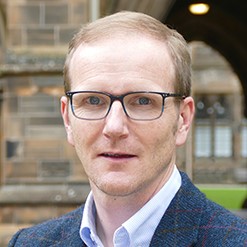
Graeme Roy is Dean of External Engagement in the College of Social Sciences at the University of Glasgow and, since 2022, chair of the Scottish Fiscal Commission.
Prior to this, he was Director of the Fraser of Allander Institute at the University of Strathclyde and a former Senior Civil Servant in the Scottish Government, where he was Head of the First Minister’s Policy Unit and a Senior Economic Adviser.
He is one of the co-leads on a project – supported by the John Templeton Foundation – to commemorate the tercentenary of Adam Smith.
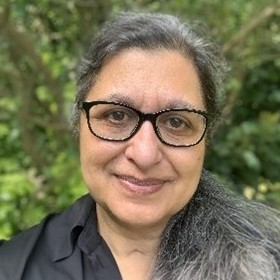
Satwat Rehman is the Chief Executive of One Parent Families Scotland (OPFS). Satwat has more than 30 years’ experience in the voluntary and public sector in Scotland and England, working in the fields of equalities, education, employability, economic development/regeneration and early years and childcare.
Satwat has been a member of several commissions and advisory groups including the National Advisory Council on Women and Girls, the Just Transition Commission and the Scottish Government’s Social Renewal Advisory Board.
Satwat is also on the boards of Child Poverty Action Group (UK) and Children in Scotland, a trustee of Wellbeing Economy Alliance Scotland, and chair of Intercultural Youth Scotland.

Graeme Armstrong is a Scottish writer from Airdrie. His teenage years were spent within North Lanarkshire’s gang culture. He was inspired to study English Literature following his reading of Irvine Welsh’s Trainspotting at just sixteen.
Alongside overcoming his own struggles with drug addiction, alcohol abuse and violence, he defied expectation to read English as an undergraduate at the University of Stirling, where, after graduating with honours, he returned to study a Masters’ in Creative Writing.
His debut novel, The Young Team is inspired by his experiences.
Partners

With thanks to the University of Glasgow for supporting this event as part of its work to mark the Adam Smith Tercentenary.


